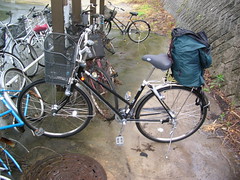Going to record a bit on the English Support Lounge that Yokkaichi University started this year. I will present a short description of the program and a student who has visited the Lounge will come and answer some questions. This is what I intend to say. I had to write the questions myself. Of course this will be in Japanese, but I wrote everything in English. It's just easier. I'll translate the questions for the radio announcer.
Q: Who thought of the English Support Lounge or “ESL” program?
A: Of course the ESL as it exists today is the result of many people’s input, but the original idea was Gordon Rees’s of the Sogo Sesaku Faculty. He came to me with the idea some months ago and we decided to try to build this kind of facility.
Q: And is the ESL?
A: The ESL is a place where students at Yokkaichi University can come and get help with their English Language development. It is a comfortable, relaxed atmosphere where students can come to enjoy a little conversation with university staff or their friends in English or about English.
Q: Does the university have an English Department?
A: No, Yokkaichi University does not have an English Department, but the school has always had a deep commitment to English Language learning. The teachers at the university are accessible and eager to work with students, and the Community College offers a variety of very popular English classes to the community. The ESL is just another method for students here at the university to improve their language ability in a way that is fun and easy on their pocket books.
Q: Where is the ESL located?
A: It is in the student lounge area, a place that is easily accessible to the students. Many of the students walk through the lounge on their way to class, or spend time there between classes. We decided to locate it there, so that students could make the lounge a part of the school routine. On the way to or from class, they can stop in for a cup of coffee and a quick chat, and between classes they can stop for some serious study or help with their homework.
Q: When is the ESL open?
The ESL is open now at a variety of times. We have a total of (X?) hours, where there is someone there who can talk to the students, answer questions that they have, or just listen to their wants and needs. The teachers and staff members who work there are all their on a volunteer basis. They all have a variety of talents that they can share with the students, all the way from extensive English language teaching experience to job hunting and international volunteer experience.
Q: What does the future hold for the ESL?
We see the ESL as a place where students can come and learn outside of the traditional classroom setting. It can be flexible in offering support for learners, can offer more hours of English language contact for students who want them, and can provide a variety of activities for fun and learning. We will be focusing on TOEIC test preparation, fun gatherings like shared meals and other kinds of entertainment in English, and more scholarly activities like speeches and learning workshops.
